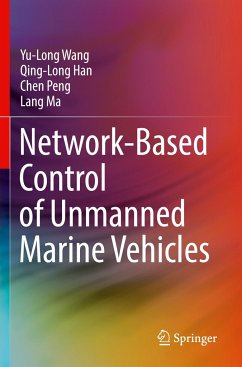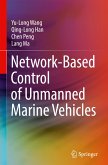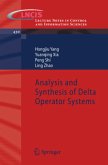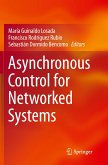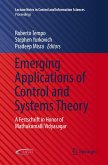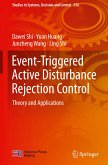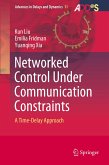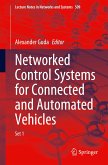- Broschiertes Buch
- Merkliste
- Auf die Merkliste
- Bewerten Bewerten
- Teilen
- Produkt teilen
- Produkterinnerung
- Produkterinnerung
This book presents a comprehensive analysis of stability, stabilization, and fault detection in networked control systems, with a focus on unmanned marine vehicles. It investigates the challenges of network-based control in areas like heading control, fault detection filter and controller design, dynamic positioning, and cooperative target tracking. Communication networks in control systems can induce delays and dropouts, so the book presents the importance of stability analysis, stabilize, and fault detection. To help readers gain a deeper understanding of these concepts, the book provides…mehr
Andere Kunden interessierten sich auch für
![Network-Based Control of Unmanned Marine Vehicles Network-Based Control of Unmanned Marine Vehicles]() Yu-Long WangNetwork-Based Control of Unmanned Marine Vehicles112,99 €
Yu-Long WangNetwork-Based Control of Unmanned Marine Vehicles112,99 €![Analysis and Synthesis of Delta Operator Systems Analysis and Synthesis of Delta Operator Systems]() Hongjiu YangAnalysis and Synthesis of Delta Operator Systems75,99 €
Hongjiu YangAnalysis and Synthesis of Delta Operator Systems75,99 €![Asynchronous Control for Networked Systems Asynchronous Control for Networked Systems]() Asynchronous Control for Networked Systems75,99 €
Asynchronous Control for Networked Systems75,99 €![Emerging Applications of Control and Systems Theory Emerging Applications of Control and Systems Theory]() Emerging Applications of Control and Systems Theory112,99 €
Emerging Applications of Control and Systems Theory112,99 €![Event-Triggered Active Disturbance Rejection Control Event-Triggered Active Disturbance Rejection Control]() Dawei ShiEvent-Triggered Active Disturbance Rejection Control104,99 €
Dawei ShiEvent-Triggered Active Disturbance Rejection Control104,99 €![Networked Control Under Communication Constraints Networked Control Under Communication Constraints]() Kun LiuNetworked Control Under Communication Constraints97,99 €
Kun LiuNetworked Control Under Communication Constraints97,99 €![Networked Control Systems for Connected and Automated Vehicles Networked Control Systems for Connected and Automated Vehicles]() Networked Control Systems for Connected and Automated Vehicles214,99 €
Networked Control Systems for Connected and Automated Vehicles214,99 €-
-
-
This book presents a comprehensive analysis of stability, stabilization, and fault detection in networked control systems, with a focus on unmanned marine vehicles. It investigates the challenges of network-based control in areas like heading control, fault detection filter and controller design, dynamic positioning, and cooperative target tracking. Communication networks in control systems can induce delays and dropouts, so the book presents the importance of stability analysis, stabilize, and fault detection. To help readers gain a deeper understanding of these concepts, the book provides fundamental concepts and real-world examples.
This book is a valuable resource for researchers and practitioners working in the field of network-based control for unmanned marine vehicles.
This book is a valuable resource for researchers and practitioners working in the field of network-based control for unmanned marine vehicles.
Produktdetails
- Produktdetails
- Verlag: Springer / Springer Nature Switzerland / Springer, Berlin
- Artikelnr. des Verlages: 978-3-031-28607-0
- 2023
- Seitenzahl: 220
- Erscheinungstermin: 4. Mai 2024
- Englisch
- Abmessung: 235mm x 155mm x 13mm
- Gewicht: 341g
- ISBN-13: 9783031286070
- ISBN-10: 3031286073
- Artikelnr.: 70579378
- Herstellerkennzeichnung
- Springer Nature c/o IBS
- Benzstrasse 21
- 48619 Heek
- Tanja.Keller@springer.com
- Verlag: Springer / Springer Nature Switzerland / Springer, Berlin
- Artikelnr. des Verlages: 978-3-031-28607-0
- 2023
- Seitenzahl: 220
- Erscheinungstermin: 4. Mai 2024
- Englisch
- Abmessung: 235mm x 155mm x 13mm
- Gewicht: 341g
- ISBN-13: 9783031286070
- ISBN-10: 3031286073
- Artikelnr.: 70579378
- Herstellerkennzeichnung
- Springer Nature c/o IBS
- Benzstrasse 21
- 48619 Heek
- Tanja.Keller@springer.com
Professor Yu-Long Wang received the B.Sc. degree in Computer Science and Technology from Liaocheng University, Liaocheng, China, in 2000, and the M.Sc. and Ph.D. degrees in Control Science and Engineering from Northeastern University, Shenyang, China, in 2006 and 2008, respectively. He was Postdoctoral Research Fellow and Research Fellow at Central Queensland University, North Rockhampton, QLD, Australia, an Academic Visitor at the University of Adelaide, Adelaide, SA, Australia, and Professor at Jiangsu University of Science and Technology, Zhenjiang, Jiangsu, China. In 2017, he was appointed as an Eastern Scholar by the Municipal Commission of Education, Shanghai, China, and joined Shanghai University, Shanghai, China, where he is currently Professor. Professor Wang has been conducting research in the area of networked control systems and motion control of unmanned marine vehicles. He has authored or co-authored more than one hundred (100) fully refereed high quality articles in prestigious journals and leading conferences, where one (1) article in Automatica (one of the top journals in the control field) and twenty (20) regular articles in the most prestigious IEEE Transactions. He received the 2021 IEEE International Conference on Recent Advances in Systems Science and Engineering Best Paper Award and the 2021 International Conference on Life System Modeling and Simulation Best Student Paper Award. He has been Principal Investigator of more than 20 projects granted by National Key R&D Program of China, National Science Foundation of China, and so on. Professor Wang has served as Co-chair of IEEE IES Technical Committee on Network-Based Control Systems and Application; Associate Editor of 2 international journals including "International Journal of Fuzzy Systems," "ICIC Express Letters, Part B: Applications"; Youth Associate Editor of the international journal "Advances in Manufacturing"; Guest Editor of Neurocomputing, "Special issue on deep learning in distributed and networked complex systems," and Guest Editor of Electronics, "Special Issue on Recent Progresses and Applications in Automatic Intelligent Control"; Co-chair of the Special Session "Network-based Control Systems and Their Applications," The 46th Annual Conference of the IEEE Industrial Electronics Society, 2020; Chair of the Special Session "Network-based Control Systems and Their Applications," The 45th Annual Conference of the IEEE Industrial Electronics Society, 2019; Workshop/Tutorial Chair of the 2018 Australian and New Zealand Control Conference, 2018; Chair of the Special Session "Networked Control and Its Applications," The 44th Annual Conference of the IEEE Industrial Electronics Society, 2018; Co-chair of the Technical Track "Control Systems and Applications," The 27th IEEE International Symposium on Industrial Electronics, 2018; Chair of the Special Session "Network-Based Control, Filtering and Their Applications," The 27th IEEE International Symposium on Industrial Electronics, 2018; and Co-chair of the Special Session "Control and Filtering of Distributed Networked Systems," The 43rd Annual Conference of the IEEE Industrial Electronics Society, 2017. He is also Member of IEEE. Professor Qing-Long Han is Pro Vice-chancellor (Research Quality) and Distinguished Professor at Swinburne University of Technology, Melbourne, Australia. He held various academic and management positions at Griffith University and Central Queensland University, Australia. He received the Ph.D. degree in Control Engineering from East China University of Science and Technology in 1997. Professor Han has been conducting research in the areas of networked control systems, cyber-physical systems, time-delay systems, multi-agent systems, smart grids, offshore structure, unmanned surface vehicles, cybersecurity, and neural networks. Since 2001, as of 11 December 2022, he has authored or co-authored four hundred and fourteen (414) fully refereed high quality journal articles including two hundred and thirty (230) articles in the most prestigious IEEE Transactions and forty-two (42) articles in Automatica. He has also authored or co-authored one hundred and eighty-eight (188) international leading conference papers, six (6) monographs, and one (1) research-based book chapter and edited four (4) conference proceedings and ten (10) special issues. His research work has been cited 42,098 times with an h-index of 113, an i10-index of 369 according to Google Scholar. Moreover, his research work has been cited 35,771 times with an h-index of 107 according to SCOPUS and 32,439 times with an h-index of 103 according to Clarivate Web of Science Core Collection. Professor Han was awarded The 2021 Norbert Wiener Award (the Highest Award in systems science and engineering, and cybernetics) and The 2021 M. A. Sargent Medal (the Highest Award of the Electrical College Board of Engineers Australia). He was therecipient of The 2022 IEEE SMC Society Andrew P. Sage Best Transactions Paper Award, The 2021 IEEE/CAA Journal of Automatica Sinica Norbert Wiener Review Award, The 2020 IEEE Systems, Man, and Cybernetics Society Andrew P. Sage Best Transactions Paper Award, The 2020 IEEE Transactions on Industrial Informatics Outstanding Paper Award, and The 2019 IEEE Systems, Man, and Cybernetics Society Andrew P. Sage Best Transactions Paper Award. Professor Han is Member of the Academia Europaea (The Academy of Europe). He is Fellow of The International Federation of Automatic Control (IFAC) and Fellow of The Institution of Engineers Australia (IEAust). He is Highly Cited Researcher in both Engineering and Computer Science (Clarivate). He has served as AdCom Member of IEEE Industrial Electronics Society (IES), Member of IEEE IES Fellows Committee, and Chair of IEEE IES Technical Committee on Networked Control Systems. Currently, he is Editor in Chief of IEEE/CAA Journal of Automatica Sinica, Co-editor in Chief of IEEE Transactions on Industrial Informatics, and Co-editor of Australian Journal of Electrical and Electronic Engineering. Professor Chen Peng received the M.Sc. and Ph.D. degrees from the Chinese University of Mining Technology, Xuzhou, China, in 1999 and 2002, respectively. From September 2002 to August 2004, he was Postdoctoral Research Fellow in applied mathematics at Nanjing Normal University, Nanjing, China. From November 2004 to January 2005, he was Research Associate with Hong Kong University, Hong Kong. From July 2006 to August 2007, he was Visiting Scholar at the Queensland University of Technology, Brisbane, Australia. From September 2010 to August 2012, he was Postdoctoral Research Fellow at Central Queensland University, Rockhampton, Australia. He is currently Professor with the School of Mechatronic Engineering and Automation, Shanghai University, Shanghai, China. Professor Peng has been conducting research in the areas of networked control systems, cyber-physical systems, supply chain, smart grids, and cybersecurity. As of 11 December 2022, he has authored or co-authored one hundred and eighty-seven (187) fully refereed high quality journal articles including fifty-seven (57) articles in the most prestigious IEEE Transactions and three (3) articles in Automatica. He has also authored or co-authored, three (3) monographs, and edited three (3) conference proceedings and four (4) special issues. His research work has been cited 12,905 times with an h-index of 63, an i10-index of 143 according to Google Scholar. Professor Peng is Associate Editor of several international journals, including the IEEE Transactions on Industrial Informatics, Information Sciences, and Transactions of the Institute of Measurement and Control. He was named Highly Cited Researcher 2020, 2021, and 2022 by Clarivate. Dr. Lang Ma received the B.S. degree in Mathematics and the M.Sc. degree in Operational Research and Cybernetics from Shandong University, Jinan, China, in 2014 and 2017, respectively, and Ph.D. degree in Control Science and Engineering from Shanghai University, Shanghai, China, in 2022. His current research interests include networked control systems, multi-agent systems, and motion control for unmanned marine vehicles.
Introduction.- Quantitative Analysis and Synthesis of NCSs.- FDF Design for Data Reconstruction-Based NCSs.- Output Feedback Control of NCSs under A Stochastic Scheduling Protocol.- Network-Based Heading Control of UMVs.- FDF and Controller Coordinated Design for UMVs.- T-S Fuzzy Dynamic Positioning Controller Design for UMVs.- Network-Based Dynamic Output Feedback Control of UMVs.- Cooperative Target Tracking of Multiple UMVs Under Switching Topologies.
Introduction.- Quantitative Analysis and Synthesis of NCSs.- FDF Design for Data Reconstruction-Based NCSs.- Output Feedback Control of NCSs under A Stochastic Scheduling Protocol.- Network-Based Heading Control of UMVs.- FDF and Controller Coordinated Design for UMVs.- T-S Fuzzy Dynamic Positioning Controller Design for UMVs.- Network-Based Dynamic Output Feedback Control of UMVs.- Cooperative Target Tracking of Multiple UMVs Under Switching Topologies.

